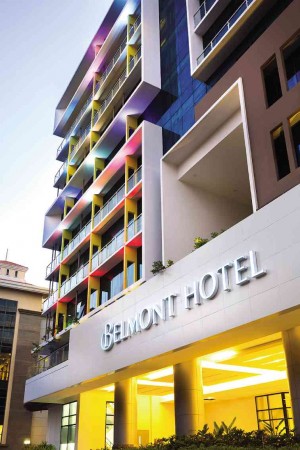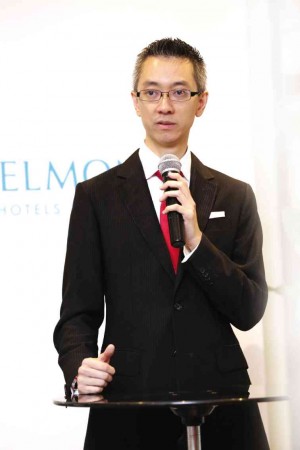Belmont Hotel takes luxury in its ideal location
FOR LORENZO Tang, the main task of a hotel general manager is to create an environment where clients and hotel staff have as many “touchpoints” as possible.
Through the “touchpoints,” a hotelier gains insight on what truly makes a guest return. It is the ambiance, the quality of service, and the tiny million things in between that prompts guests to make memories in the hotel.
Tang is the guiding hand of Belmont Hotel, a businessman’s hotel that weaves simple sophistication into every nook and cranny of its facade and services.
The Italian-born Tang became a hotelier even before he stepped out of college. He interned at the Grand Hotel Minerva in Florence, Italy. The challenge of being a working student paid off when the hotel took him under its wings as an employee.
In the succeeding years, he worked in several five-star luxury hotels, including the Mandarin Oriental in Hong Kong. After devoting a good number of years in business hotels found mostly in cities, Tang moved to Maldives.
In managing a resort hotel, Tang felt closer to nature. “It was a different feeling—from the environment to the culture and behavior of the people I deal with,” he says.
In 2012, he received a phone call inviting him to be the hotel manager of Seda Centrio in Cagayan de Oro. The clamor to experience a more diverse culture got him packing his bags and head to the Philippines.
Two years later, he applied to head Megaworld’s second local hotel brand in the Philippines.
The 34-year-old Tang loves a good challenge. For him, building a brand from the ground up requires a lot of focus on the small details.
“Every hotel must focus on the guest’s needs and expectations. It’s all about finding the right compromise on what is essential, what is expected from the price value. [All of these] contribute to the [overall] perception of the brand,” he says.
He notes that in just a span of five years, so much has changed in the tourism industry. “Years ago, guests would just ask for a room. Now, the first thing they ask is ‘Do you have Wi-Fi?’”
He sees the Philippines as a newbie in the tourism industry compared to Thailand and India. But the country, he says, is growing exponentially. “There is a demand for more infrastructure here,” he says.
Belmont was built within the vibrant Newport City in Pasay where other hotels (Marriot, Maxim’s and Remington) are found. But what Tang seeks to offer guests is “quality accommodation.”
There is an influx of international brands, he says. “But what [the Philippines] lacks is a real local hotel group with standards that international travelers are looking for.”
Belmont Hotel positions itself as a businessman’s hotel offering luxury that most five-star hotels have. The 10-story building with 480 rooms opened its doors last Oct. 8.
“We concentrate on rooms. The details for us are important,” he adds. The 22-square meter room has a comfortable bed lined with duvets. Each room has as a background of the airport’s runway. Roofdeck 11 has a swimming pool, which overlooks Terminal 3’s busy runway.
But more importantly, Tang notes that it all goes back to the service they provide. “We do not sell computers here. We deal with people. The staff is the real face of the hotel. They have to have the right training and qualifications. We are trying to carve our own working culture where there is a unified mindset. To create an ecosystem where each employee would believe in our own brand.”
He believes investing in people is the key to sound hotel management. Empowerment and improvement, he says, provide good soil to help employees grow into their own person who will eventually inspire others and be a source of good guest relations.
He tells his employees never to tolerate mediocrity. “Go for the possibility of doing more,” he says.
He wants his people to grow their careers in such a way they are not just after the pay increase but also for their personal growth as well. “The organization grows when its people are growing with it at the same time,” Tang adds.
Tang says more are in store for Belmont’s clients.
He says the hotel will benefit from the construction of an air-conditioned walkway that will connect Newport City to Terminal 3. A first in the Philippines, the walkway’s first stop will be at Belmont Hotel.
“We envision passengers to lounge in Cafe Belmont where we offer a fusion of Mediterranean and local flavors while they wait for their flights,” he says.
Belmont Hotel also benefits from its location near the Skyway, which cuts travel time to Makati in just five minutes.
Belmont Hotel is set to open in Cebu and Boracay in the next five years, he says.
Tang says the rise of more hotels in those areas is a mere response to the demand for rooms. Some hotels experience 95 percent occupancy rate during peak seasons.
High-rollers and passengers often opt to stay in a hotel near the airport to avoid the hassle of the perennial traffic problem in the metro, he says.
Working hand in hand with Megaworld’s expertise in building townships, Belmont aspires to be a local brand that offers international standards and exudes Filipino hospitality.
“At the end of the day, all I want for my guests is for them to make memories here. That will make them want to go back and relive it,” he says.


